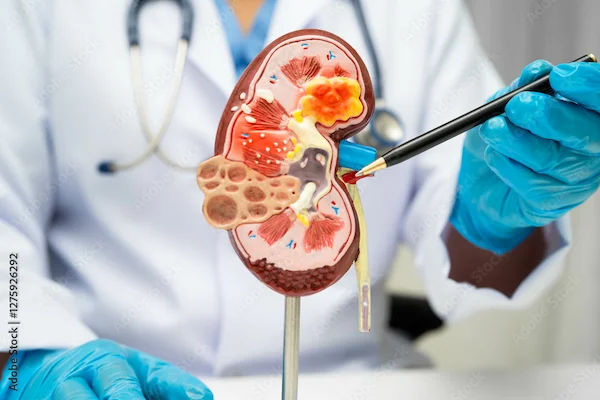Kidney Transplant How Long Does It Take?
How long is kidney transplant surgery? Learn about the typical 3-4 hour procedure, what happens in the operating room, and the initial hospital stay afterward.

Written by
Last updated on 17th Jul, 2025
_5.webp)
Introduction
If you or a loved one is considering a kidney transplant, you likely have many questions, especially about the timeline. A kidney transplant is a lifechanging procedure that can significantly improve quality of life for those with endstage kidney disease. However, the process involves multiple steps, and the time it takes can vary depending on several factors.
In this article, we’ll break down the kidney transplant journey, from evaluation to recovery, in simple terms so you know what to expect.
Understanding Kidney Transplant
A kidney transplant is a surgical procedure where a healthy kidney from a donor (either living or deceased) is placed into a person whose kidneys no longer function properly. This is often the best treatment option for people with chronic kidney disease (CKD) or kidney failure, offering better longterm survival and quality of life compared to dialysis.
How Long Does a Kidney Transplant Take?
The entire process—from evaluation to full recovery—can take months or even years. Here’s a step-by-step breakdown:
1. Evaluation & Approval (1-6 months or longer)
Before being listed for a transplant, you must undergo a thorough medical evaluation to ensure you’re a suitable candidate. This includes:
Blood tests
Imaging scans (like ultrasound or CT)
Heart and lung function tests
Psychological assessment
If approved, you’ll be placed on the national transplant waiting list (if receiving a deceased donor kidney). The waiting time varies—some patients get a match within months, while others wait years.
2. Finding a Donor (Varies)
Living Donor Transplant: If a family member or friend is willing to donate, the process can be faster (a few months).
Deceased Donor Transplant: The wait depends on blood type, tissue match, and availability.
3. The Transplant Surgery (3-6 hours)
The actual surgery takes about 3 to 6 hours. You’ll be under general anesthesia, and the surgeon will place the new kidney in your lower abdomen, connecting it to blood vessels and the bladder.
4. Hospital Recovery (5-10 days)
After surgery, you’ll stay in the hospital for monitoring. Doctors will check for signs of rejection and ensure the kidney is functioning well.
5. Full Recovery (3-6 months)
While you may feel better within weeks, full recovery takes several months. You’ll need regular followups, take immunosuppressant medications (to prevent rejection), and follow a strict diet and lifestyle plan.
Consult Top Nephrologists
Factors That Affect the Timeline
Factors that affect the timeline are:
Type of donor (living vs. deceased) – Living donor transplants are faster.
Health condition – Additional medical issues may delay approval.
Organ availability – Wait times vary by region and blood type.
Recovery speed – Some people heal faster than others.
Life After a Kidney Transplant
A successful transplant can give you a new lease on life, but it requires lifelong care:
Take prescribed medications (especially immunosuppressants).
Follow a kidney-friendly diet (low salt, controlled protein).
Stay active (light exercises like walking).
Avoid infections (practice good hygiene).
Regular checkups (to monitor kidney function).
When to See a Doctor?
If you or a loved one has kidney disease and is considering a transplant, consult a nephrologist (kidney specialist) to discuss options. Need help? You can book a consultation with expert doctors at Apollo 24|7 for personalized guidance on kidney transplants and care.
Final Thoughts
A kidney transplant is a journey that requires patience, but it can offer a healthier, more active life. While the process may seem long, each step is crucial for success. If you’re on this path, stay positive, follow medical advice, and lean on your support system. Would you like to learn more or schedule a test? Visit Apollo 24|7 for expert care and support.
Consult Top Nephrologist
Consult Top Nephrologists

Dr. S Bipin Kumar
Nephrologist
13 Years • MBBS, MD General Medicine, DM, Nephrology
Rajamahendravaram
SG KIDNEY CARE, Rajamahendravaram

Dr. Luvdeep Dogra
Nephrologist
10 Years • MBBS, MD, DM (NEPHORLOGY)
Jaipur
Dr Dogras Health Clinic, Jaipur

Dr. Govardhan Gupta
Nephrologist
15 Years • MBBS, DNB General Medicine, DrNB Nephrology
Mumbai
Oscar Superspeciality Hospital, Mumbai

Dr. Siddharth Herur
Nephrologist
4 Years • MBBS, MD General Medicine, DM Nephrology
Kurnool
Medicover hospital and Gurudatta poly clinic, Kurnool

Dr. Anantha Rao
Nephrologist
7 Years • MBBS, DNB (General Medicine), DNB (Nephrology)
Kurnool
Aakash hospital and KIMS hospital, Kurnool
Consult Top Nephrologist

Dr. S Bipin Kumar
Nephrologist
13 Years • MBBS, MD General Medicine, DM, Nephrology
Rajamahendravaram
SG KIDNEY CARE, Rajamahendravaram

Dr. Luvdeep Dogra
Nephrologist
10 Years • MBBS, MD, DM (NEPHORLOGY)
Jaipur
Dr Dogras Health Clinic, Jaipur

Dr. Govardhan Gupta
Nephrologist
15 Years • MBBS, DNB General Medicine, DrNB Nephrology
Mumbai
Oscar Superspeciality Hospital, Mumbai

Dr. Siddharth Herur
Nephrologist
4 Years • MBBS, MD General Medicine, DM Nephrology
Kurnool
Medicover hospital and Gurudatta poly clinic, Kurnool

Dr. Anantha Rao
Nephrologist
7 Years • MBBS, DNB (General Medicine), DNB (Nephrology)
Kurnool
Aakash hospital and KIMS hospital, Kurnool


.webp)
_8.webp)